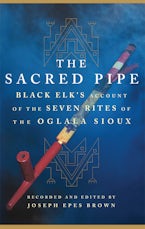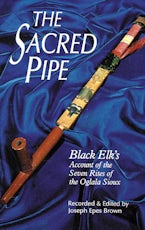- Home
- The Civilization of the American Indian Series
- religion
- social science
- history
- The Sacred Pipe
The Sacred Pipe
Black Elk’s Account of the Seven Rites of the Oglala Sioux
by Black Elk and Joseph Epes Brown
Published by: University of Oklahoma Press
Imprint: University of Oklahoma Press
172 Pages | 6 x 9 | 18 b&w illus.
$21.95
$21.95
Black Elk of the Sioux has been recognized as one of the truly remarkable men of his time in the matter of religious belief and practice. Shortly before his death in August, 1950, when he was the "keeper of the sacred pipe," he said, "It is my prayer that, through our sacred pipe, and through this book in which I shall explain what our pipe really is, peace may come to those peoples who can understand, and understanding which must be of the heart and not of the head alone. Then they will realize that we Indians know the One true God, and that we pray to Him continually."
Black Elk was the only qualified priest of the older Oglala Sioux still living when The Sacred Pipe was written. This is his book: he gave it orally to Joseph Epes Brown during the latter's eight month's residence on the Pine Ridge Reservation in South Dakota, where Black Elk lived. Beginning with the story of White Buffalo Cow Woman's first visit to the Sioux to give them the sacred pip~, Black Elk describes and discusses the details and meanings of the seven rites, which were disclosed, one by one, to the Sioux through visions. He takes the reader through the sun dance, the purification rite, the "keeping of the soul," and other rites, showing how the Sioux have come to terms with God and nature and their fellow men through a rare spirit of sacrifice and determination.
The wakan Mysteries of the Siouan peoples have been a subject of interest and study by explorers and scholars from the period of earliest contact between whites and Indians in North America, but Black Elk's account is without doubt the most highly developed on this religion and cosmography. The Sacred Pipe, published as volume thirty-six in the Civilization of the American Indian Series, will be greeted enthusiastically by students of comparative religion, ethnologists, historians, philosophers, and everyone interested in American Indian life.
Joseph Epes Brown (1920-2000) was an American scholar whose lifelong dedication to Native American traditions helped bring the study of American Indian religious traditions into higher education. His book, The Sacred Pipe, is an account of his discussions with the Lakota holy man, Black Elk. "I traveled among many of the prairie Indians," Brown said, "and after meeting the old Sioux priest Black Elk, I was asked by him to record the account he should give me of his ancient religion. This volume I really consider to be his work and his contribution to the Sioux."
"This is a faithful transcription by Mr. Brown of the words of Black Elk, the last of the Sioux holy men to know his tribe's religious rites, together with their history and significance...Mr. Brown lived with Black Elk on the reservation, and the holy man, in order to preserve the Siouan rites both for the whites and for his own people, told him all he knew of the rites." —Saturday Review
“Mr. Brown brought to his task genuine respect for the vanishing culture of the Sioux and for the values of their religious system.”—Library Journal
"His admiration for Black Elk and his people is obvious . . . He has done a fine job producing a book that is a valuable contribution to American Indian literature." —San Francisco Chronicle



